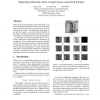Free Online Productivity Tools
i2Speak
i2Symbol
i2OCR
iTex2Img
iWeb2Print
iWeb2Shot
i2Type
iPdf2Split
iPdf2Merge
i2Bopomofo
i2Arabic
i2Style
i2Image
i2PDF
iLatex2Rtf
Sci2ools
132
Voted
CVPR
2004
IEEE
2004
IEEE
Separating Reflections from a Single Image Using Local Features
When we take a picture through a window the image we obtain is often a linear superposition of two images: the image of the scene beyond the window plus the image of the scene reflected by the window. Decomposing the single input image into two images is a massively ill-posed problem: in the absence of additional knowledge about the scene being viewed there is an infinite number of valid decompositions. In this paper we describe an algorithm that uses an extremely simple form of prior knowledge to perform the decomposition. Given a single image as input, the algorithm searches for a decomposition into two images that minimize the total amount of edges and corners. The search is performed using belief propagation on a patch representation of the image. We show that this simple prior is surprisingly powerful: our algorithm obtains "correct" separations on challenging reflection scenes using only a single image.
Algorithm Searches | Computer Vision | CVPR 2004 | Prior Knowledge | Simple Prior | Single Image | Single Input Image |
Related Content
| Added | 12 Oct 2009 |
| Updated | 12 Oct 2009 |
| Type | Conference |
| Year | 2004 |
| Where | CVPR |
| Authors | Anat Levin, Assaf Zomet, Yair Weiss |
Comments (0)

